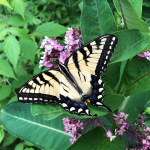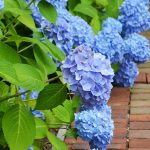Floral Support at Connecticut’s Trade Secrets
From growers and merchants to artisans and authors, there’s a garden guru around every corner at the Connecticut Trade Secrets annual garden show.
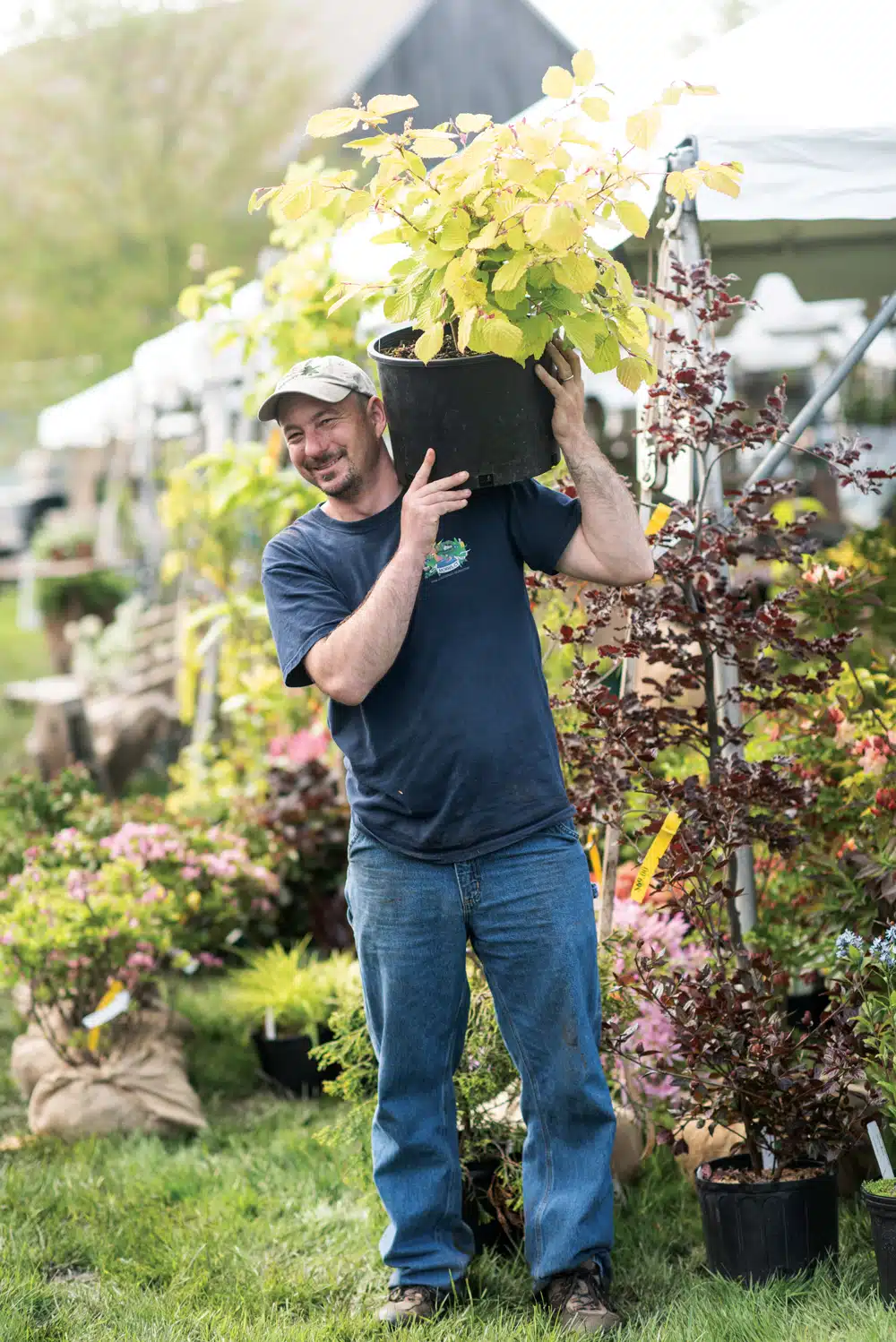
Coffee By Design | Portland, Maine
Photo Credit : Katherine KeenanIt’s like the starting bell for spring. Other sales try to imitate it, other regions wish they’d hit on the idea first, but nothing compares to the frisson on the field at Trade Secrets in Sharon, Connecticut, where in-the-know folks like Martha Stewart hoof it between booths, scooping up rare plants and garden antiques. A serious case of cabin fever was responsible for jump-starting Trade Secrets 20 years ago. Interior designer Bunny Williams was surveying her Litchfield County greenhouse, overflowing with too many seedlings and cuttings after a long winter, when inspiration struck. “Let’s have a sale!” she said to her gardener, Naomi Blumenthal. It just so happened that Naomi was a volunteer with Women’s Support Services, a local group combating domestic violence, which was delighted to be the beneficiary of the sale. Bunny invited a group of favorite growers and an equal number of garden antiques dealers to bring their wares for a mid-May event, and Trade Secrets was born.
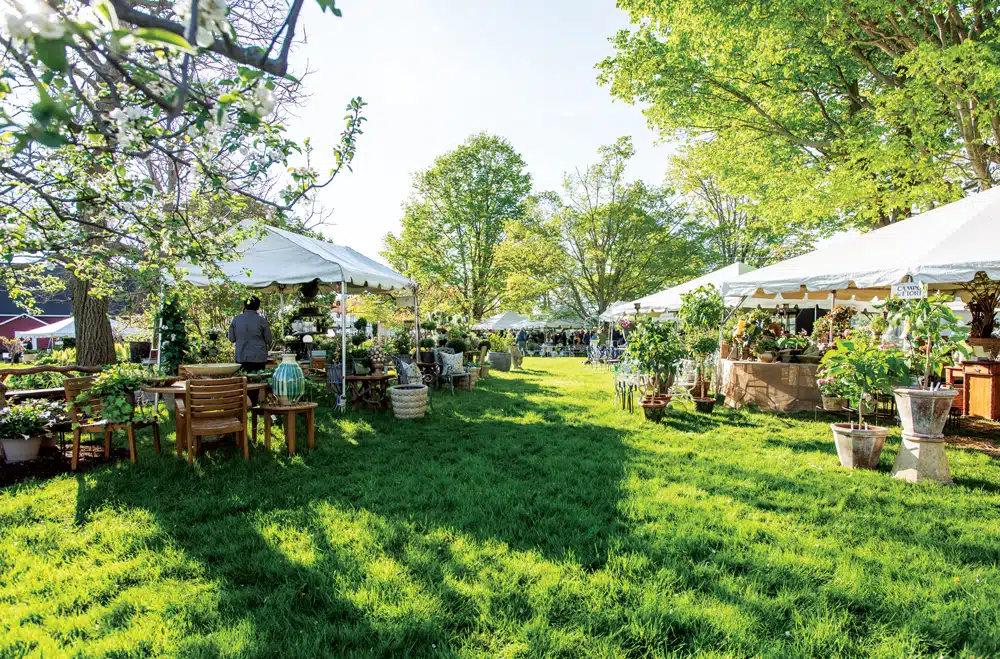
Photo Credit : Kindra Clineff
Attendance has seen a steady uptick. Last year, the sale drew 1,500 attendees and 250 volunteers, the latter schlepping wagons of purchases to and fro, directing traffic, serving food. Originally held at Williams’s home in Falls Village, the event now takes place at LionRock Farm, a 600-acre estate and working farm in Sharon. It’s a far cry from aisles of booths lined up on a dusty field: Given the lavish displays and vendors spilling goodies among statuary, perennial beds, and a pool pavilion, the location is a jaw-dropper.
The sale is held rain or shine—or snow—on a Saturday in May; on the following day, tours of a few stellar local gardens (including Williams’s own) make a full weekend out of the event. Here, we give you a sneak peek at some of the gurus you might run into at Trade Secrets.
Connecticut’s “Trade Secrets” Experts
Adam Wheeler | Broken Arrow Nursery in Hamden, CT
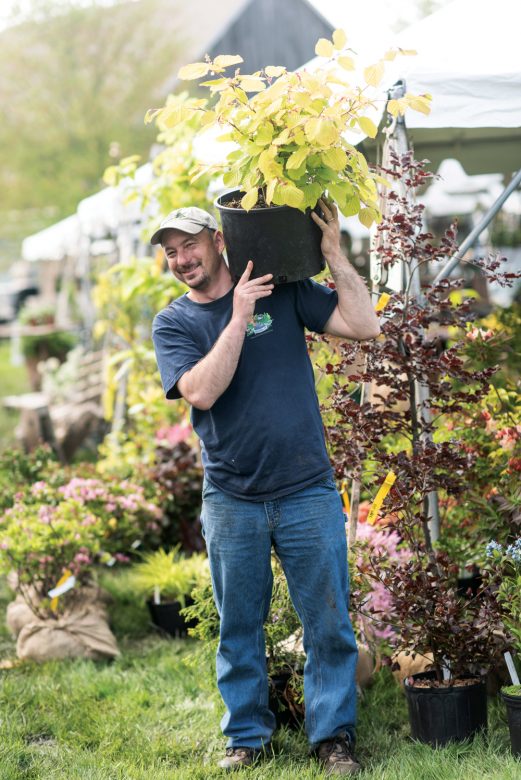
Photo Credit : Kindra Clineff
Specialty: Shrubs
For gardeners tired of the same old inventory of spireas at their local nursery, Broken Arrow Nursery’s display is a welcome sight. Sure, there are some intriguing spins on familiar shrubs here—but you might also meet that exotic heartthrob you never knew existed. Rumor has it that many of Broken Arrow’s most sensational specimens are hidden in the deep recesses of its nursery until being unveiled at the show.
Noteworthy plant: Rosa glauca. An admitted “foliage kinda guy,” Adam Wheeler singles out this species rose as his favorite shrub. Flowers usually rule in the rose arena, but smoky purple leaves and a tidy 6-by-6-foot vase-shaped structure mean R. glauca is always well dressed (its dainty single pink flowers in late spring/early summer are almost an afterthought). Zone 3 hardiness doesn’t hurt either.
Trade secret: Roses love to be pruned, and R. glauca is no exception. Because foliage is this rose’s strong suit, pruning is the secret to triggering more color-saturated stems as well as to achieving a graceful shape.
Helen O’Donnell | The Bunker Farm in Dummerston, VT
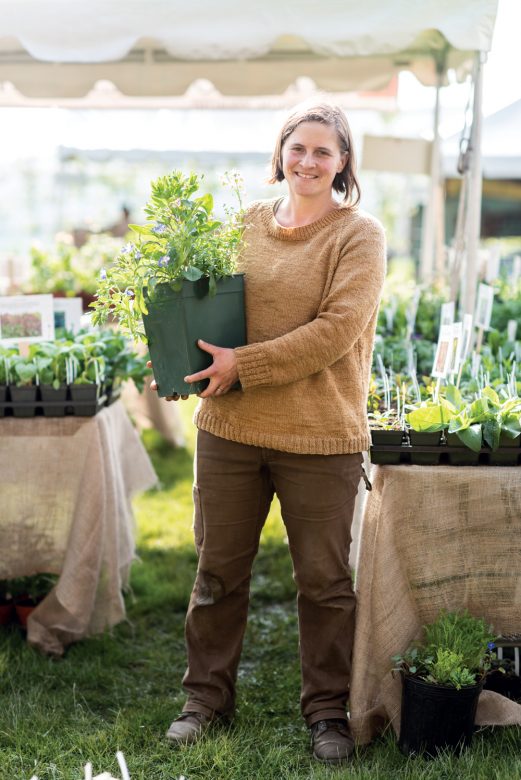
Photo Credit : Kindra Clineff
Specialty: Unusual annuals and perennials
In making her picks from the Bunker Farm’s 300 different varieties—all grown from seed—Helen O’Donnell doesn’t do the same old supertunias often associated with annuals. Instead she brings connoisseur collectibles like tall, single, remarkably patterned marigolds from Britain’s fabled Great Dixter. And if you draw a blank upon hearing “nemesia,” “mimulus,” “cuphea,” or “nolana,” swing by her booth to see them in full bloom. For O’Donnell, Trade Secrets offers the chance to meet all kinds of kindred spirits who are eager to try offbeat botanicals. “There’s such a high concentration of serious gardeners,” she marvels. “It’s like bumping into one plant genius after another.”
Noteworthy plant: Nemesia cheiranthus ‘Masquerade’. This one tends to disappear into customers’ wagons in a flash. Envision a wiry plant crowned by a halo of lemon-yellow blossoms that look like fascinators. Unlike most nemesias, it endures months of heat before petering out.
Trade secret: O’Donnell credits her impressive seedling success rate to repotting them three times. While it’s labor-intensive, the gradual progression from seed tray to plug to 4-inch pot makes for a more robust plant.
Dennis Mareb | Windy Hill Farm in Great Barrington, MA
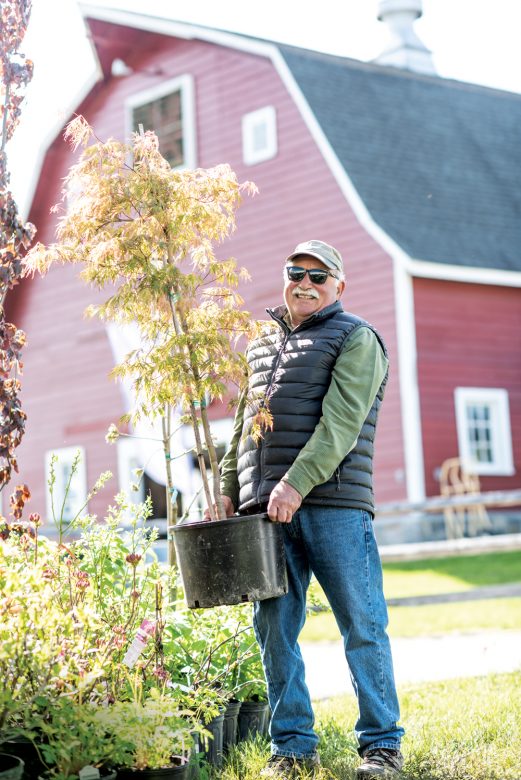
Photo Credit : Kindra Clineff
Specialty: Trees
An original Trade Secrets vendor, Dennis Mareb once took a hiatus from the event, thinking that his nursery was so close by, his presence wasn’t necessary. (After all, lugging a forest of potted trees to a sale isn’t easy.) But in the end, he missed being there. “The energy is like nowhere else on earth,” he says, “plus there’s the goodwill of a great cause.” While Mareb wishes he could bring some of his nursery’s behemoths, he’s OK with showcasing smaller trees. “We’re not snobs,” he says, adding, “That beautiful-looking lilac will jump onto the truck as well.”
Noteworthy plant: Acer x pseudosieboldianum ‘Ice Dragon’. An answered prayer for people in cold climates—aka New Englanders—who want to grow Japanese maples, this small-stature maple offers a cut leaf, impressive autumn color, and (most critically) the ability to stand up to a snow load and extremely cold temperatures.
Trade secret: While maintaining that there’s no real secret to growing this plant, Mareb does offer this advice: “‘Ice Dragon’ has a nice form without special pruning. It grows in sun or partial shade, but wouldn’t be happy with wet roots.”
Peter Joppe | Hillside Nursery in Shelburne Falls, MA
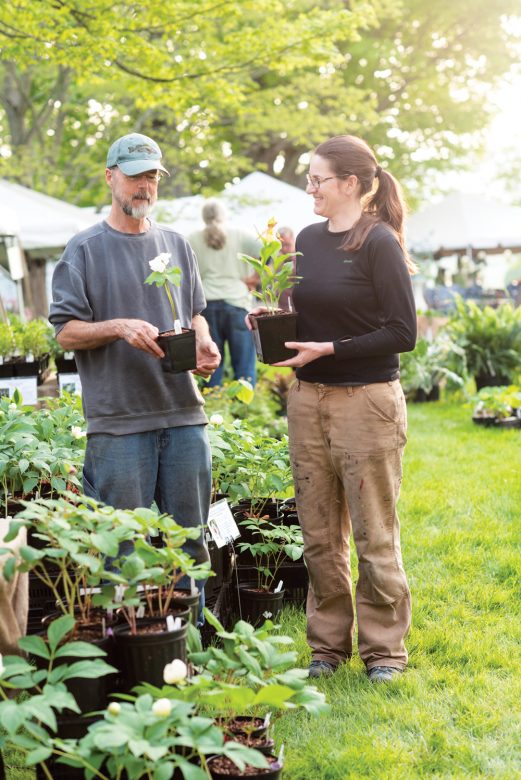
Photo Credit : Kindra Clineff
Specialty: Woodland plants
“You’re not going to find these plants at your typical nursery,” says Peter Joppe, who—along with assistant manager Amy Murray—will be bringing about 1,000 woodland wildflowers to Trade Secrets from the mountains of Western Massachusetts. And that rarity isn’t lost on the crowd: At one show, when word got out that Hillside had pristine nursery-propagated lady’s slipper orchids, there was almost a stampede. Woodland peonies, trilliums, Solomon’s seal, hepatics, native pachysandras, and bellworts also go home with those who rise at dawn to jostle for position in the early-buyer line.
Noteworthy plant: Cypripedium ‘Victoria’ x C. pubescens x C. fasciolatum. As a breeder, Joppe strives to build a better plant, and this lady’s slipper orchid is a sterling example of an easy-to-grow woodlander with stunning blooms.
Trade secret: “A battle we’ve faced for years is the perception that lady’s slipper orchids are difficult to grow,” says Joppe. “Yes, Cypripedium acaule does require a special soil fungus to thrive, but other lady’s slippers are much easier. Give them shade and moist soil, but don’t overwater. Our secret: Put a few handfuls of pea gravel into the planting hole.”
Ed Bowen | Issima in Little Compton, RI
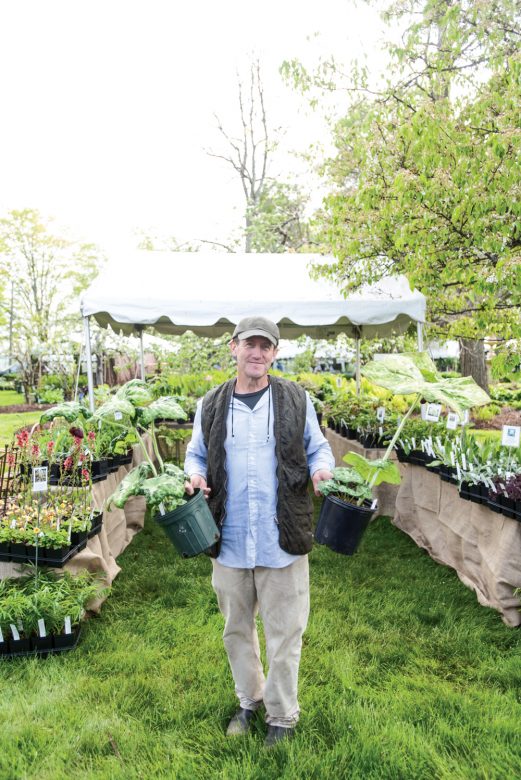
Photo Credit : Kindra Clineff
Specialty: Unusual hardy perennials
Collectors make a beeline to Trade Secrets to purchase plants they never knew existed, which is exactly what Ed Bowen spends his time propagating and testing at the Rhode Island nursery he cofounded with Taylor Johnston. Although he doesn’t know what he’ll bring until the week of the show (“Really, I load up whatever looks good that week,” he admits), he’ll be pulling from a deep pool of cuttings and seedlings raised specifically to awe gardeners: hydrangeas grown primarily for their neon foliage, for example, or sanguisorbas with flowers like feather boas.
Noteworthy plant: Podophyllum hybrid. With leaves that make you feel you’re about to be high-fived by a dinosaur, podophyllums have shock appeal even before they start budding up. The immense, colorful, succulent foliage of Bowen’s version is riveting—“like woodland sculpture”—and then the blood-red blossoms appear.
Trade secret: Podophyllums are shade lovers that “prefer the humus-y duff that’s accumulated in the woods over millennia,” Bowen says.
Sharon Mrozinski | Marston House in Vinalhaven, ME
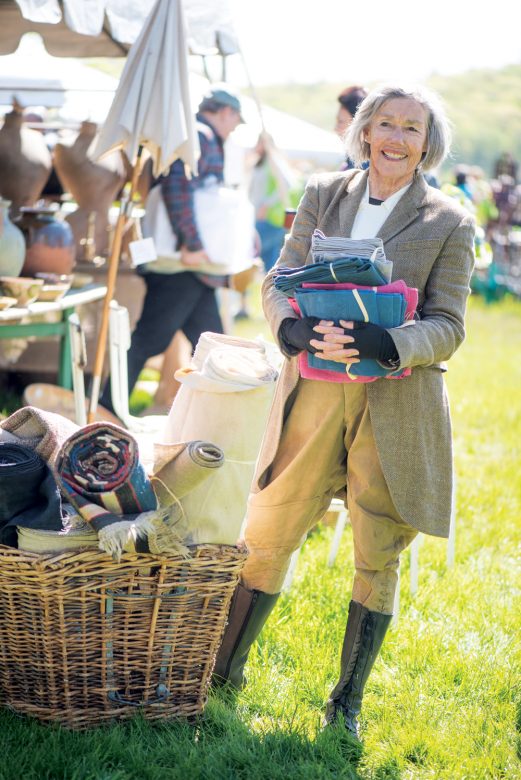
Photo Credit : Kindra Clineff
Specialty: Antiques and accessories
Decked out in vintage jodhpurs and a crisp linen shirt, Sharon Mrozinski is hard to miss. Her booth overflows with antique linens, shepherd’s smocks, baskets, and vintage old porcelain pitchers. Need a curtain for your cabana? How about drapes that come complete with a story of their provenance from a Paris butcher’s window? Mrozinski herself is as colorful as her wares and a wealth of information to boot.
Trade secret: To remove stains from centuries-old linen (rust marks are particularly stubborn), Mrozinski suggests running the fabric through a cycle in the washing machine with a gentle non-bleaching soap and warm water, and then leaving it to soak. “Sometimes it will take days,” she says. Fortunately, gardeners are infinitely patient.
Izzy Fitch | Battle Hill Forge in Millerton, NY
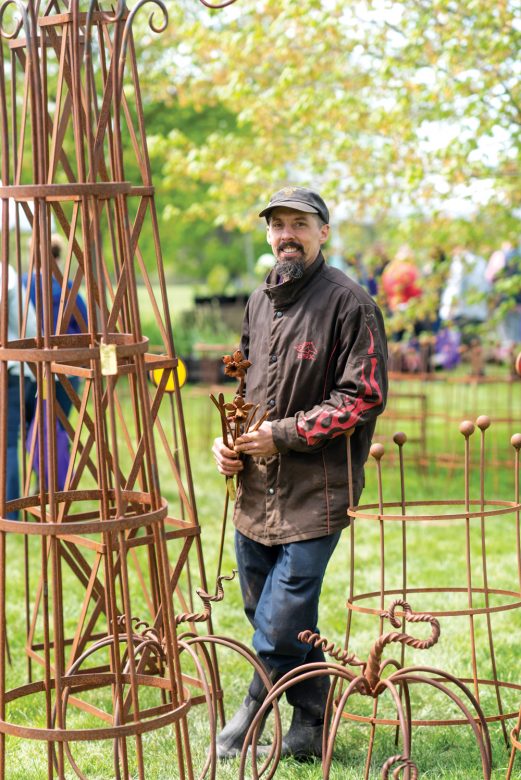
Photo Credit : Kindra Clineff
Specialty: Hand-forged metal pieces
One of six artisans selling wares at Trade Secrets, Izzy Fitch was a natural pick given the presence of his creations in garden tours the day after the sale. The tuteurs, fences, and various plant supports that he fashions are really collaborations with clients—“That’s how you get innovation,” he says—and clearly, the smith listens and learns from seasoned gardeners. For example, he can explain how clematis vines need a tower that broadens at the top to support their span, whereas tall vines such as morning glories might be best clambering up a 10-foot tower. His best-selling item? Embracers to support peonies and grasses.
Trade secret: “When a support is being used to keep a plant from flopping, it should cinch the plant about halfway up,” Fitch advises. “Any higher, and it will end up looking unnatural—like a straitjacket.”
Connecticut’s “Trade Secrets” | The Not-So-Secret Details
What: Trade Secrets, an annual weekend event featuring a rare plant and garden antiques sale and a garden tour
When: Sale runs 8 a.m.–3 p.m. Saturday, May 16; garden tour runs 10 a.m.–4 p.m. Sunday, May 17
Where: LionRock Farm, Sharon, Connecticut
Cost: Sale admission is $125 early/$50 regular/$25 late; garden tour is $50
Because: In addition to offering top-shelf garden inspiration, this weekend is the year’s main fund-raiser for Women’s Support Services, a nonprofit working to end domestic violence in northwest Connecticut and surrounding communities in New York and Massachusetts.
This year’s Trade Secrets garden show has been canceled due to the pandemic, but plans are already underway for 2021. Learn more, plus how you can help Women’s Support Services, at tradesecretsct.com.


